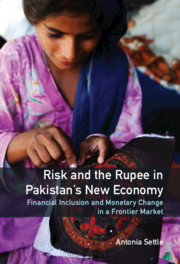 Risk and the Rupee in Pakistan's New Economy
Risk and the Rupee in Pakistan's New Economy Published online by Cambridge University Press: 31 March 2020
Emerging economies in Asia have seen capital flows boom. Between the early 1980s and the mid-2000s, capital flows to emerging economies like Thailand and Malaysia grew by a multiple of 10. Yet as the regulatory environment and the financial architecture that it constructs have opened up to the global economy, frontier markets have also seen huge growth in flows. In Pakistan, for example, capital inflows have shot up by a multiple of 20 over those same years. However, this huge growth in flows has been accompanied by an increasing instability in those same flows. Starting to rise after 1988, capital flows to Pakistan became extremely volatile after 2000. Shifting rapidly from negative territory to spikes of US$8 and US$10 billion, capital flows have cut a figure of sharp peaks and troughs in the new millennium. This is typical of capital flows to frontier economies, which after 2010 not only exceeded those to emerging economies in GDP terms but were also accompanied by a marked rise in volatility (Rodrik 2015). These sorts of data are indicative of a dramatic ‘opening up’ of developing and frontier economies to a global financial economy, as well as of a distinct instability accompanying those flows.
Key to this predicament is the mode of monetary governance in the frontier context. By definition open to global markets and constituted by less ‘mature’ institutions than their emerging cousins, formal monetary management in frontier economies tends to track the inflation targeting norm set by the advanced economies with a regulatory regime sometimes called ‘inflation targeting lite’. Frontier markets have thus moved away – as reflected in their ‘investability’ – from previously dominant norms of the protected markets and direct monetary policy tools of earlier decades (such as setting exchange rates and prices), towards open markets and the indirect tools of market-driven monetary policy (that is, attempting to control inflation by setting the short-term interest rate). Yet the replication of advanced economy monetary policy is challenged by the complexity of the institutional context, both formal and informal, which is implied by the ‘frontier’ label.
To save this book to your Kindle, first ensure no-reply@cambridge.org is added to your Approved Personal Document E-mail List under your Personal Document Settings on the Manage Your Content and Devices page of your Amazon account. Then enter the ‘name’ part of your Kindle email address below. Find out more about saving to your Kindle.
Note you can select to save to either the @free.kindle.com or @kindle.com variations. ‘@free.kindle.com’ emails are free but can only be saved to your device when it is connected to wi-fi. ‘@kindle.com’ emails can be delivered even when you are not connected to wi-fi, but note that service fees apply.
Find out more about the Kindle Personal Document Service.
To save content items to your account, please confirm that you agree to abide by our usage policies. If this is the first time you use this feature, you will be asked to authorise Cambridge Core to connect with your account. Find out more about saving content to Dropbox.
To save content items to your account, please confirm that you agree to abide by our usage policies. If this is the first time you use this feature, you will be asked to authorise Cambridge Core to connect with your account. Find out more about saving content to Google Drive.